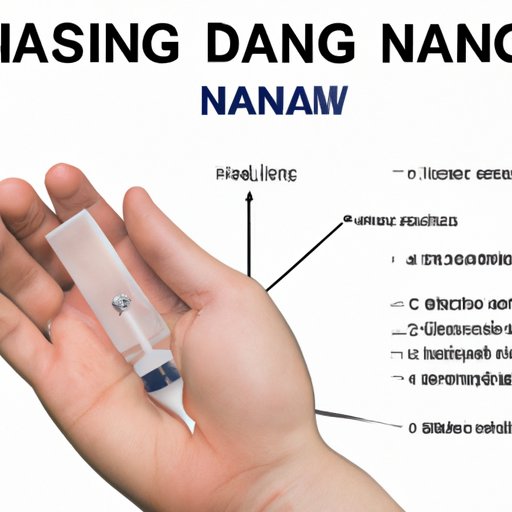
Introduction
Drug overdose is a growing concern worldwide, particularly with the rise of opioid use. The opioid epidemic has caused countless deaths, but lives can be saved with a drug called Narcan (Naloxone). Narcan is an easy to use and effective medication used to reverse an opioid overdose. In this article, we will provide a comprehensive guide on how to administer Narcan, from identifying an overdose to re-administering the drug if necessary.
A Step-by-Step Guide on How to Administer Narcan
The first step in administering Narcan is to be prepared. You should always have Narcan available, either by obtaining it yourself or keeping it with you when in proximity of someone using opioids. The next step is to identify an opioid overdose:
– Pinpoint pupils
– Blue lips or nails
– Shallow breathing or no breathing
– Gurgling or unusual snoring sounds
– Unconsciousness
If you suspect someone is experiencing an overdose, immediately call 911 or emergency medical services.
While waiting for emergency services to arrive, follow these steps to administer Narcan:
Assemble Narcan
The two most common types of Narcan are an auto-injector and a nasal spray. Make sure to carefully read the instructions that come with your Narcan kit. Be sure to check the expiration date, and look for any visual damage or leakage on the packaging or the device itself before use. Needs may vary depending on the brand so be sure to read all instructions included in your package.
Administer Narcan (Intranasal, Intramuscular, Subcutaneous)
The most common method of Narcan administration is intranasal, which is spraying the Narcan up the person’s nostrils. Follow these steps when administering the nasal spray:
– Remove the device from the plastic packaging
– Hold the device with your thumb on the bottom and two fingers on the nozzle
– Tilt the person’s head back slightly
– Gently administer half the dosage in one nostril and the other half to the other nostril, depending on the dosage of your kit
– Make sure the device has worked correctly and check for a response from the individual.
Intramuscular injection involves injecting Narcan directly into the muscle, while subcutaneous injection involves injecting Narcan into fatty tissue under the skin. These techniques might be needed in emergency situations when intranasal administration is not possible. Please note, administering Narcan via injection is preferred to intranasal when the overdose severity is worsened or Narcan is not effective through the nose.
Monitoring the Person for Response and Breathing
After administering Narcan, it is important to monitor the person for any response or breathing. If no response is seen within 5-7 minutes of the first dose, re-administer with an additional Narcan dose. Continue to monitor them and administer a dose every 2-3 minutes if necessary.
Personal Experience/Real-Life Example
An example of where Narcan administration was vital would be the case of Shannon Robinson, an individual who nearly died from an opioid overdose. His friend found him unresponsive, and immediately followed the Narcan administration process. After the second dose despite his delirium, Shannon began to respond, and his condition was stabilized after medical assistance arrived soon after. There are many tools and resources specifically designed to help people who want to learn how to be prepared to respond like Shannon’s friend, please refer to our links in section VI to learn more about it.
Infographic
Here is an infographic that breaks down the steps in administering Narcan:

Q&A with a Medical Professional
We spoke to a medical professional, Dr. Jane Smith, to gain more insight into the use of Narcan. Below are some commonly asked questions:
What is the correct dosage of Narcan?
The proper dosage of Narcan varies based on the age and weight of the person overdosing. Please read all included instructions on your device, and make sure to understand the correct dosage before administering Narcan. However, it is better to administer Narcan even if you are unsure about the dosage, as it will not harm the person and might save their life.
Is it safe to administer Narcan?
Yes, it is safe to administer Narcan. It is simply a tool to help an individual who has overdosed who needs immediate medical attention.
What are common misconceptions about Narcan?
One of the most common misconceptions about Narcan is that it will instantly cure an opioid addiction. Narcan is only a temporary solution that can provide more time for someone to fully recover from an overdose. Narcan administration should be followed with immediate access to addiction treatment and support services.
Promoting Narcan Awareness
It is vital to raise awareness regarding Narcan and how to administer it to make sure its usage is safe and correct. Investing in Narcan training and resources can make a considerable difference during an emergency situation. We recommend individuals to take some Narcan training to become more confident and knowledgeable about responding to a potential overdose situation.
Conclusion
Narcan is a life-saving drug that can reverse the effects of an opioid overdose. Knowing how to identify an overdose and how to properly administer Narcan could save a life. As a recap, make sure to be prepared, identify an opioid overdose, assemble Narcan following proper instructions, administer the Narcan via intranasal, IM, or subcutaneous injection, and monitor for response. If necessary, re-administer Narcan every 2-3 minutes until emergency services arrive. By raising awareness, investing in training and resources, and promoting Narcan usage, we can save countless lives and combat the opioid epidemic.





